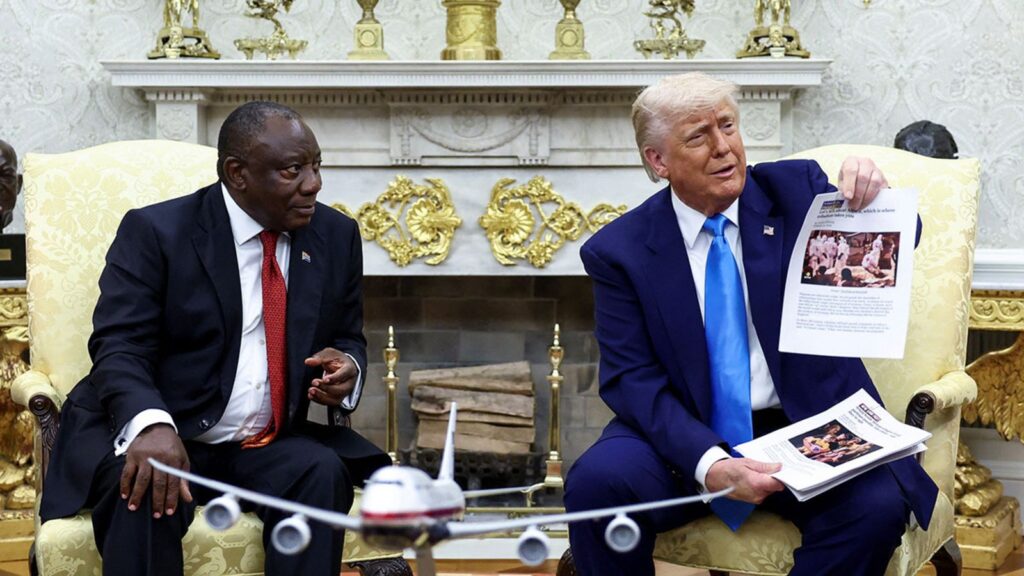Contentious Encounter: Trump and Ramaphosa in the Oval Office
In a surprising and tense exchange at the White House, former President Donald Trump confronted South African President Cyril Ramaphosa regarding issues faced by the Afrikaner community. This meeting has sparked a mix of reactions within South Africa, particularly among right-wing Afrikaner groups who view Trump’s comments as a validation of their concerns.
Trump’s Intervention Draws Mixed Reactions
Many right-wing Afrikaner factions celebrated Trump’s unexpected scrutiny of Ramaphosa, particularly the Solidarity Movement, which had previously traveled to the United States to lobby for support. They praised Trump for bringing South Africa’s issues to a global audience, with movement leaders insisting that the crisis surrounding farm murders should receive international attention. “Trump deserves a Nobel Prize for his efforts in addressing our challenges,” stated Jaco Kleynhans, a prominent figure in the Solidarity Movement.
On social media, Afrikaner political commentator Ernst Roets noted, “Donald Trump made history today,” highlighting the gravity of the situation. However, not everyone shares this admiration. Columnist Pieter du Toit criticized the situation as the result of years of misinformation fed into the American political narrative, arguing that the confrontation exemplified the power of such exaggerated claims.
Ramaphosa’s Steadiness Under Pressure
During the meeting, President Ramaphosa maintained his composure, often smiling in contrast to Trump’s aggressive demeanor. His delegation included significant political figures, such as John Steenhuisen, head of the Democratic Alliance (DA) and the highest-ranking white politician in the government. Steenhuisen acknowledged the safety issues prevalent in South Africa but emphasized that the majority of farmers wish to remain in the country and contribute positively.
In a discourse riddled with tension, Ramaphosa countered Trump’s assertions regarding the “persecution” of Afrikaners, weighing in on the country’s democratic values and the right for diverse voices within the political spectrum. He pointed out that while his administration opposes the methods of the Economic Freedom Fighters (EFF), South Africa’s constitution guarantees their existence.
Amplification of Political Divisions
The U.S. President’s presentation included footage of EFF leader Julius Malema singing the controversial “Shoot the Boer,” a song criticized by Afrikaners as inciting violence against farmers. While this song resonates with many within the EFF, the South African legal system has deemed it a protest anthem rather than a literal call to arms. Ramaphosa’s delegation defended the EFF’s political rights while underscoring the overall crime rates and safety concerns affecting all South Africans, rather than a specific racial agenda.
Perspectives from Across the Spectrum
Among the attendees, reactions varied widely. South African billionaire Johann Rupert pointed out that violent crime affects various communities, not limited to race. His sentiment echoed the observations made by Zingiswa Losi, president of a major trade union, who emphasized that the real issue is crime affecting the majority of the population. Losi highlighted the suffering of black South Africans facing severe hardships in rural areas.
| Speaker | Key Point |
|---|---|
| Donald Trump | Claims of Afrikaner persecution and farm murders. |
| Cyril Ramaphosa | Reinforced South Africa’s democratic framework and opposed violence. |
| John Steenhuisen | Stressed the desire of most farmers to stay and contribute to South Africa. |
| Zingiswa Losi | Highlighted crime as a universal problem affecting all races. |
A Divided Nation
The aftermath of this encounter highlights the polarized nature of South African society and showcases the intersection between local dynamics and international political discourse. While some Afrikaners express fears of living in South Africa, Trump’s offer for refugee status appears to resonate with a segment of this community. Conversely, Ramaphosa continues to promote unity, harking back to Nelson Mandela’s legacy in the pursuit of national reconciliation.
As the discussions around race, crime, and politics persist, it remains clear that South Africa’s future relies heavily on collective efforts to address the socio-economic challenges faced by all its citizens.


